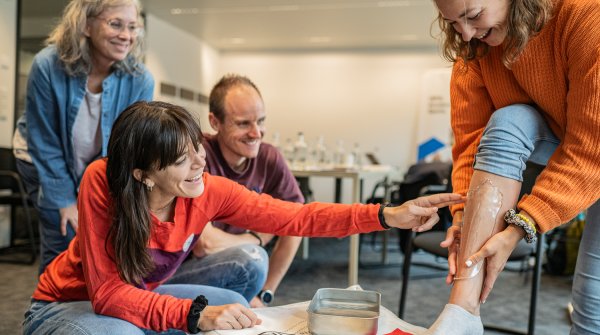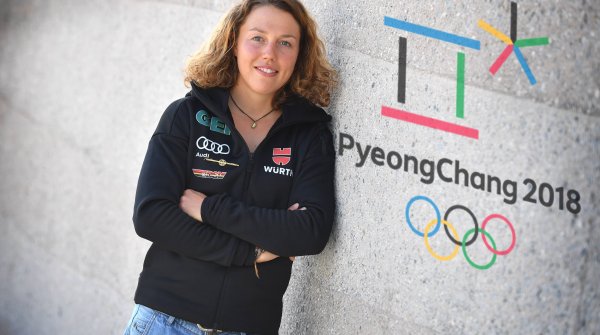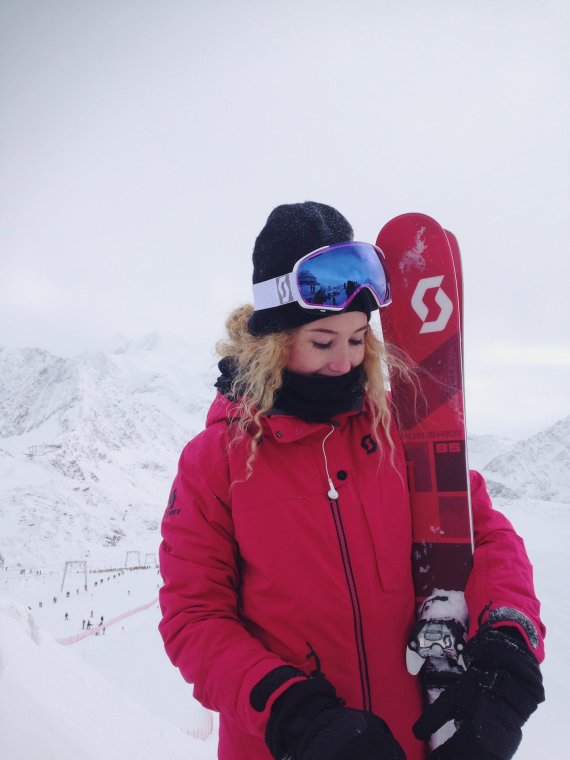
Between two lectures, there’s still time for a conversation in Munich’s university quarter: Nina Schlickenrieder is over-punctual. With her athletic-casual outfit and wild blond hair, the 19-year-old definitely stands out in the fully occupied café. Positively.
Nina Schlickenrieder in an interview
ISPO.com: Ms. Schlickenrieder, was the loipe too boring for you?
Nina Schlickenrieder: (laughs) No, I wouldn’t say that. That my brother and I didn’t end up in cross-country like our father wasn’t a decision against his sport, but rather for freeskiing.
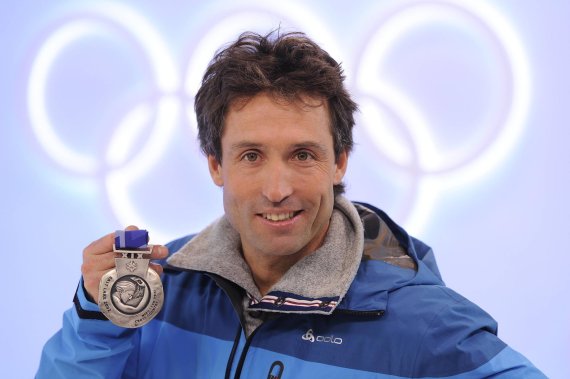
You and your brother are among the biggest German slopestyle talents in Germany. Most German winter sports fans will know familiar with your last name, but most likely because of your father. Are you often confronted with the fact that you’re a Schlickenrieder?
Sure, it’s happened. My father was a renowned cross-country skier, and is still a big presence as an ARD expert. What’s funny is: Lots of people may be able to recognize our last name, but they don’t know exactly from where. Something to do with winter sports. Cross-country and slopestyle don’t have anything to do with each other in the slightest.
All the same, you are off on skis, too. A real winter sports family, right?
Yes, but I would rather say: We’re an outdoor family. Because while I do a lot of mountain biking, I’d also like to take part in a trail bike race sometime, too. My brother’s often there too – and by now my father is on his bike a lot, too. Then he takes my mother along, too. My mom used to ski, too.
Little competition at freeski contests
The fact that the younger Schlickenrieders are so athletic had to have almost come about by force. Which one of you has the bigger ambitions?
Like Lukas, I’m a part of the DSV’s C squad. It’s more difficult for Lukas, who’s two years younger: There are lots more boys who freeski, so the competition is hard. For us, sometimes no more than ten girls compete at a Eurocup, and at smaller competitions in Canada there may be no more than 25.
The level for the men is much higher. Lisa Zimmermann (editor’s note: incumbent slopestyle world champion) is the world’s only woman to master the double cork. That trick is a basic requirement for the men. But I’m convinced: My brother is so talented that he could get an Olympic medal one day – if he really wants to.
And yourself? What are your athletic goals?
I’d like to qualify for the Olympics. This winter I wanted to really tackle the world cups and the world championship, but then in early October I tore my lateral meniscus in the first competition in Kaunertal. Now I’m allowed to slowly get started again.
A new chapter in your life began in October: You’re now a student.
Yes, I’m studying to become a teacher in English and economics at the Ludwig Maximilian University of Munich. It’s definitely an adjustment.
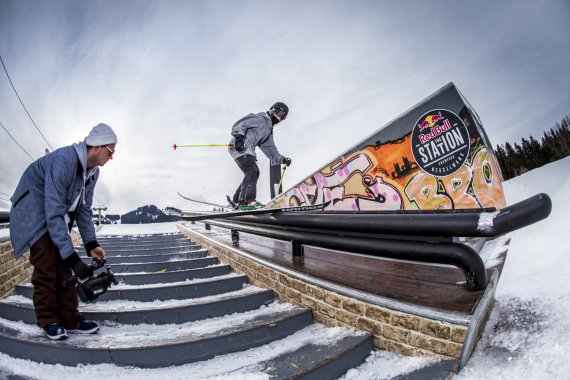
What do you mean?
Well, after I graduated high school I was on the road for a year, in Whistler from November 2015 to May 2016. It’s a completely different environment, in the Canadian freeski sites especially there’s an extremely laid-back atmosphere. Everyone wears whatever they feel like. Just relaxed. And now I’m sitting in classes with business students who look at you funny when you, as a woman, have a cap on.
100 euros from Sporthilfe
You’re focusing on studying and sports – wouldn’t a purely professional route have been possible?
Freeskiing is a relatively new sport and still unknown to a lot people; it’s virtually impossible to live off of it as a newcomer. Lisa (Zimmermann) is an absolute prodigy and very successful; she’s one of the few who can currently live off of our sport – but for how long? It’s important for me to do something else in addition to the sport.
How is freeskiing working for you financially, then?
The only money I receive is 100 euros a month from the Sporthilfe. I have to pay for travel and accommodations myself. I put down the entry fees for competitions at first, then invoice it through my club later. We usually get percentages for lift tickets through the DSV.
How are things with equipment?
As slopestylers, we aren’t in the DSV outfitting pool, since each individual has their own sponsors. I found an amazing outfitter: Scott provides me with complete winter and summer equipment, so bikes on top of skis and gear. That’s great of course, because material costs are pretty high.
Peter Schlickenrieder “doesn’t intervene”
Sounds like freeskiers are pretty much on their own…
Well, the support could be bigger. But there are other things that become possible through squad status with the DSV. In my studies, for example: The cooperation between the DSV and LMU makes it possible for my teaching program to take my sport into account. There’s even a mentor for that who I can always turn to. That way, I only have to go to Munich for school two days a week, and can concentrate on the sport for the rest of the week.
And the medical care through the DSV is really good: after my injury, I was able to go directly to the DSV team physician (editor’s note: Peter Brucker). He’s an absolute specialist, and I got a surgery appointment very quickly. And the rehab went very well, too.
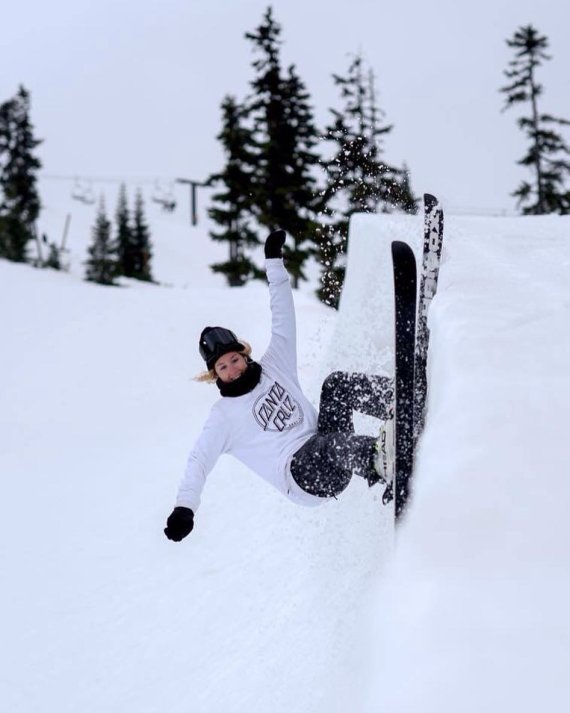
To what extent can your father, who’s also the DSV vice president, help you with sports business matters?
He is certainly a big help, he knows an incredible amount of people – but above all in the cross-country sector. He doesn’t intervene, but if I have questions I can come to him. For example, when I got a letter in the summer from my former outfitter Hamox telling me they could no longer support me, I asked Dad what I could do. He had a couple of good tips and contacts for me. When it comes to sponsors my brother is even more of a busy bee. Lukas has been committed since he was 13, and has K2 as an outfitter.
How important is social media for you as a young athlete in a trend sport?
I don’t have my own Facebook fan page, because I think that you should have bigger successes at the international level before you do something like that. I’m especially active on Instagram. Instagram is really big and super important in the USA and Canada, here’s it’s still Facebook.
“Don’t get covered in sponsor logos”
With Scott as a sponsor in the background: How private is your Instagram profile?
Hm, I’d say not extremely private, but very authentic nevertheless. These days every sponsor writes in every contract that you’re obligated to a certain number of posts, but that’s not a problem for me. It’s not enforced, anyway. Ultimately I’m active on Facebook and Instagram anyway, and I don’t post anything I’m not completely convinced of. To the contrary: Social media is a lot of fun for me; I’m happy to share my experiences with the world.
You still have a lot of space on your “Wall of Sponsors”...
Yes, but I’m in the beginning of my career. I wouldn’t want to be covered with sponsor logos and still just be making my mark on all of the social media channels. I want to freeski. And if nothing comes of the big skiing career, I might be a teacher in ten years. I think that’s a dream job, too!
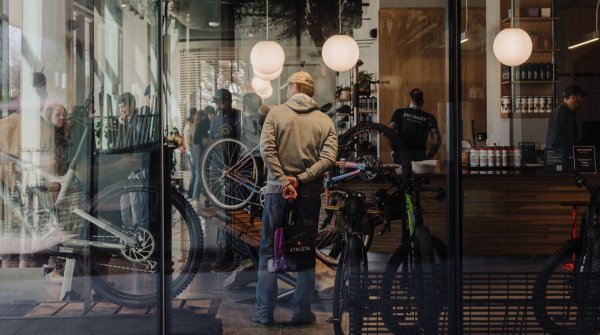 Sports BusinessThe future of the bike industry: 6 innovative bike stores
Sports BusinessThe future of the bike industry: 6 innovative bike stores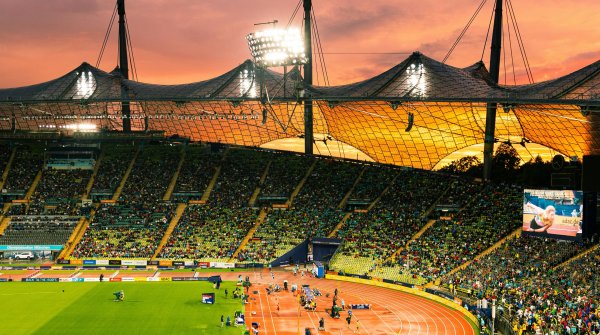
- ISPO awards
- Mountain sports
- Bike
- Design
- Retail
- Fitness
- Health
- ISPO Job Market
- ISPO Munich
- ISPO Shanghai
- Running
- Brands
- Sustainability
- Olympia
- OutDoor
- Promotion
- Sports Business
- ISPO Textrends
- Triathlon
- Water sports
- Winter sports
- eSports
- SportsTech
- OutDoor by ISPO
- Heroes
- Transformation
- Sport Fashion
- Urban Culture
- Challenges of a CEO
- Trade fairs
- Sports
- Find the Balance
- Product reviews
- Newsletter Exclusive Area
- Magazine

